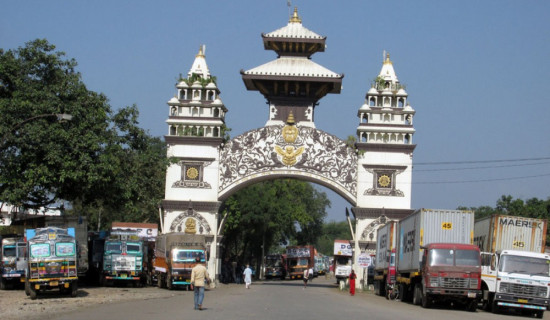- Sunday, 15 February 2026
Restore National Flag Carrier's Past Glory
As tourism is one of the major components of her economy, Nepal is in pressing need for improved air connectivity with numerous tourist generating countries worldwide. Despite being home to unmatched tourist attractions ranging from natural diversity to cultural multiplicity, the nation has not been able to fully capitalise on them for economic benefits. This is because of a lack of good air linkages, and effective marketing and promotion. There is no denying that tourism contributes considerably to the national economy through generating jobs and foreign exchanges. This multifaceted sector also directly or indirectly supports different auxiliary sectors like agriculture, livestock farming and handicraft business. These sectors can thrive together with the growth and diversification of tourism.
Globally, a host of countries that have emerged as appealing tourist destinations seem to have prioritised developing tourism products and expanding and upgrading the aviation sector side by side. With their robust commercial airlines, such nations have made a great stride in the development of tourism. Being a preferred tourist destination, Nepal also needs to have a strong, reliable and credible national flag carrier in order to help give a boost to its tourism industry. However, every successive government seems to have realised the fact that the advancement of the aviation sector could help trigger tourism growth. This is the reason behind the adoption of an open and liberal aviation policy immediately after the restoration of the multiparty democracy in 1990.
Managerial flaws
Many private airlines as well as helicopter companies are now in operation, increasing people’s access to air services. Dozens of commercial foreign international carriers have also served Kathmandu. No doubt, such airlines have been playing a crucial role in highlighting Nepal as an alluring destination for tourists belonging to varied age-groups. But our national flag carrier —Nepal Airlines Corporation (NAC) — has been going through a tricky situation over the decades. Owing to constant managerial flaws and irregularities, NAC has failed to acquire an adequate number of planes to operate domestic as well as international flights over the past three decades. Although the airline’s subsequent managements have come up with their fleet expansion plans, they appear to have been unable to equip the airline with the required number of aircraft.
With its only four aircraft (two A330s and two A320s), the airline at present operates flights to different destinations namely New Delhi, Mumbai and Bangalore, Tokyo, Bangkok, Hong Kong, Kuala Lumpur, Doha, Dubai and Riyadh. It has just two planes in operation for domestic flights. Its seven aircraft (one Twin Otter and six narrow-body) have been grounded. NAC has incurred additional losses after the acquisition of those six planes in 2014. Manufactured by the Harbin Aircraft Industry (Group) of China, two of them were donated to NAC by the Chinese government while the remaining four were purchased through loans from the Chinese Exit Bank.
Despite being one of the oldest airlines in South Asia with its glorious past, NAC has lost its reputation owing to mismanagement and corruption. It has been unable to win over passengers because its services have not been reliable. The airline has now been in serious financial trouble. It has been unsuccessful in making repayment of loans worth billions of rupees to the Employees Provident Fund and Citizen Investment Fund. It had taken the loans to purchase the A320 and A330 planes. The airline’s market share has continued to fall because of a shortage of planes. At present, its market share accounts for just 10 per cent.
What is more dismaying is that the airline has witnessed numerous scams over the past 30 years. Some of the notorious ones included Dhamija scam, Lauda Air scam, Chase Air scam and narrow-body scam. The airline had suffered a huge loss due to those fraudulent business schemes. Unsolicited political interventions were responsible for such scams that not only plunged the airline into a grave financial trouble but also damaged its public image as a credible carrier.
Perennial problem
Nevertheless, the incumbent NAC management seems to be persuading the government to allow it to move ahead with a plan for acquiring two ATR72 aircraft. It aims to use them for operating domestic flights. As a landlocked nation, Nepal must focus on the aviation sector’s development. But the perennial problem is that NAC, like most public enterprises (PEs) in the country, has failed to have a dedicated, honest and efficient management team. The airline cannot compete with other carriers without restoring its past glory. For that, the government needs to hire a competent management team for the airline. It is also important that the government come forward with a broader plan to bolster the airline without further delay so as to enable the carrier to expand its fleet for domestic and international services.
In the past, some efforts were made to strengthen the national flag carrier. Several taskforces were formed to make suggestions for the government to step up desired measures to develop NAC into an efficient commercial carrier. But what is ironic is that the reports submitted by those taskforces have gathered dust. Those in power seem to have been found reluctant to implement the reports. Many of the panels suggested that the government should come up with a concrete plan to look for an international strategic partner for NAC so as to improve its financial health. Instead, nepotism and favouritism has continued to damage the airline. A strong political commitment and will is essential to take NAC out of its persistent problems.
(The author is a freelancer.)

















